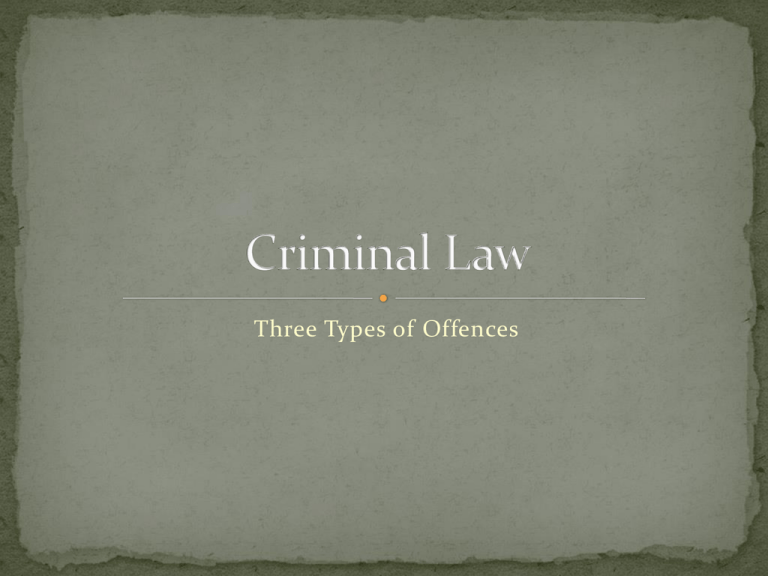
Three Types of Offences
Criminal Laws are considered to be offences against
society.
Criminal Law is intended to maintain order in society.
Criminal Law emphasizes prevention and penalties.
The criminal justice system focuses on rehabilitation and
retribution.
As with any effective set of laws, criminal law is
constantly evolving with the ever changing needs of
society.
As values and beliefs change within a society, so to do
the laws. Examples include:
Decriminalization of homosexuality.
Euthanasia
Gun control
Abortion
Pornography
Certain conditions must exist for an act to be
considered criminal:
The action must be considered harmful to other people,
and society as a whole.
The action must violate the basic values of society.
There must be a procedure in place within the justice
system to deal with criminal transgressions.
The Criminal Code is the main source of criminal law
in Canada.
The Controlled Drugs and Substances Act is also a
body of criminal law.
The Youth Criminal Justice Act is also a body of
criminal law.
No criminal law can conflict with The Charter of
Rights and Freedoms.
There are three types of criminal offences:
Summary Convictions Offences
Indictable Offences
Hybrid Offences
Are minor criminal offences.
People charged with these offences can be arrested and
summoned to court very quickly.
The maximum penalty for a summary offence is $2000
and/or six months in jail.
Example: The maximum penalty for possession of a
narcotic is $2000 and/or one year in jail.
Communicate for the purpose of
obtaining the sexual services of a
prostitute
Cause disturbance
Harassing telephone calls
Are the more serious criminal offences, and carry more
severe penalties than summary convictions.
There is a maximum penalty for each offence – up to life
imprisonment (eg. Homicide).
The Trial Judge decides the actual penalty.
Some indictable offences also have a minimum penalty
(eg. Impaired Driving can range from $600 fine to five
years behind bars depending on the number of previous
offences)
Offences which involve a weapon.
Sexual offences
Fraud
Forgery of currency
Proceeds of crimes
Trafficking narcotics
Are those where the Crown attorney has the right to
proceed summarily, and impose a less severe punishment,
or to proceed by indictment.
Theft is an example of a Hybrid Offence. Everyone who
commits theft:
is guilty of an indictable offence and liable to imprisonment
for a term not exceeding ten years, where the value of what
is stolen exceeds $5000; or
is guilty of an indictable offence not exceeding two years, or
punishable on summary conviction where the value of what
is stolen does not exceed $5000.






